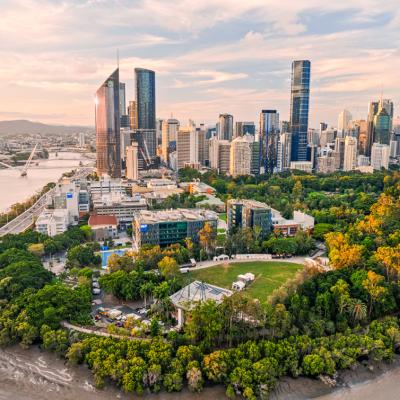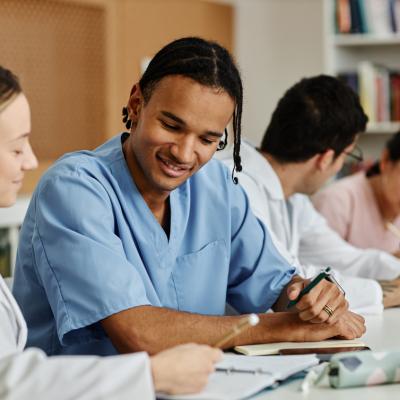If you are thinking about medical school but overwhelmed by how residency matching works, you’re not alone. The United States’ residency match can be confusing as it’s full of rules, rankings, and what-ifs. Once you understand the system though, it becomes a lot more manageable.
Whether you’re planning ahead or reapplying after not matching the first time, this guide breaks it down in plain English. And if you’re looking at international programs like The University of Queensland-Ochsner Doctor of Medicine (MD) program, we’ll show you how they prepare you to succeed in the Match.
What is matching for medical residency?
The residency match is how graduating med students in the United States (and qualified international medical grads) get placed into postgraduate training programs. It's run by the National Resident Matching Program (NRMP), which matches applicants and programs based on mutual rankings. Think of it like a dating app powered by an algorithm, except it’s for future doctors and hospitals.
Matching isn’t optional if you want to continue your medical training in the US, and for most specialties, it’s the only way in.
Students in the UQ-Ochsner MD Program are all US citizens or permanent residents, so even though they complete their first two years of study in Australia, they match back into the US system just like students from American med schools. You can read more on that in our article on international medical graduates.
How does the medical residency match work?
Here’s how it goes down:
- You apply to residency programs using ERAS (Electronic Residency Application Service).
- Programs invite you for interviews.
- After interviews, you rank the programs you want, and the Programs rank you too.
- In March, the NRMP algorithm matches students with programs based on those lists.
If there’s a match—you’re in.
To be eligible, international medical grads need ECFMG certification. UQ-Ochsner’s MD students are trained with this in mind. They prepare for the USMLE Step 1 and Step 2 CK during the program and complete their clinical years in New Orleans in the Ochsner Health System, giving them an American-based experience that residency programs value.
Are interviews required for the medical residency match?
Yes—Interviews are non-negotiable. Programs use them to get a feel for who you are and how you’ll fit, plus they also give you a chance to see if the program feels right for you.
How many should you do? As many as you can reasonably handle. More interviews = more chances to match.
UQ-Ochsner students typically interview with programs across the United States, and thanks to their citizenship and American clinical training, they don’t face the same hurdles as many other international medical graduates (IMGs).
How to match?
Matching is competitive, but doable with the right preparation. Here’s what makes an applicant stand out:
- Passing USMLE Step 1 and a strong Step 2 CK score
- Clinical experience in the United States
- Great letters of recommendation
- A clear, personal statement
- A solid rank list strategy
The UQ-Ochsner MD program is designed around all of this. Students spend their first two years in Brisbane studying a US-style curriculum. They then transition to New Orleans for clinical rotations in one of the Gulf South’s leading health systems, Ochsner Health. Additionally, there’s a dedicated US residency prep pathway with everything from CV workshops to mock interviews.
When is Match Day?
Match Day is usually the third Friday in March. It’s the day you find out where you’ll spend the next 3 to 7 years of your medical career.
Here’s how the week works:
- Monday: You find out if you matched.
- Tuesday–Thursday: If you didn’t match, you enter the SOAP (Supplemental Offer and Acceptance Program) to try to get an open spot.
- Friday: You get your official match results—cue the nerves, cheers, and group hugs.
At UQ-Ochsner, Match Day is a huge deal. In 2025, 97% of eligible students matched, with placements in fields like internal medicine, surgery, anesthesiology, pediatrics, psychiatry, and emergency medicine.
Can someone enter medical residency without applying to the match?
Technically, yes but it’s very rare.
A few programs, like military residencies or early-match specialties like urology, have separate application processes. Others may offer off-cycle or unfilled positions outside the Match but most doctors go through the NRMP system.
Bottom line: If you want the best shot at a US residency, you apply through the Match.
What is the SOAP?
If you don’t match on Monday of Match Week, don’t panic, you’re not out of the game yet.
SOAP stands for Supplemental Offer and Acceptance Program. It’s the NRMP’s official backup plan that helps unmatched applicants fill unfilled residency spots fast. Think of it as a rapid-fire second chance.
Here’s how it works:
- Monday morning: You find out you’re unmatched (or partially matched).
- Monday afternoon: You get a list of programs with unfilled positions.
- You apply to up to 45 of those programs through ERAS.
- Programs review applications and offer interviews (usually virtual).
- Rounds of offers go out Tuesday to Thursday—you can accept or decline.
If you accept an offer through SOAP, you're legally bound to that program (just like in the regular Match).
Any UQ-Ochsner MD students who go into the SOAP are coached through every step if needed, with real-time advising from faculty who know how to help you regroup quickly and confidently.
SOAP isn’t ideal but it’s a lifeline and many doctors have launched great careers thanks to it.
How to reapply for medical residency after not matching
If you don’t match the first time, it’s not the end. Many doctors match the second (or even third) time after improving their application. Here’s how:
- SOAP – Try to secure a spot during Match Week.
- Reassess – Figure out what held you back (grades, scores, experience).
- Rebuild – Take a research year, get more US clinical experience, or boost your Step 2 CK score.
- Reapply stronger the next cycle.
At UQ-Ochsner, students who don’t match the first time get access to advising, mentorship, and reapplication support. You’re not left to figure it out alone.
Wrapping it up
The medical residency Match can be intense, but it’s not impossible and definitely not something to fear. With the right preparation, mentorship, and experience, you can match into a program that fits your goals.
If you’re looking for a med school path that gives you global perspective and US residency results, the UQ-Ochsner MD program might be your launchpad.





